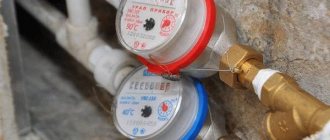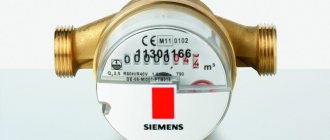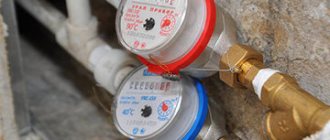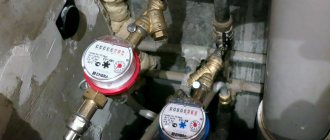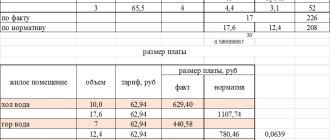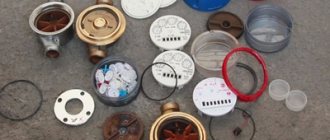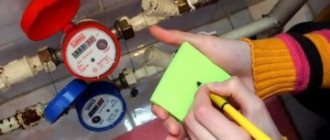Expert author of the article
Yulia Kuprina
Certified lawyer. Total work experience in the specialty is 13 years.
In most cases, installing metering devices on pipelines is beneficial. Current laws on water meters regulate the calculation procedure in the absence of water meters and in their presence. The amount to be paid in the first case may be significantly higher than when calculating by meters. In this article, we will look at the regulations in force in 2021, innovations, obligations of the apartment owner, sanctions and fines.
Legislation
The regulatory framework regarding the installation of water meters, as well as their use and verification is constantly updated and changed.
Local authorities can make changes to existing regulations and issue new acts that complement or expand the issues of operating water meters.
The general list of main acts is as follows:
- Federal Law No. 102-FZ of June 26, 2008 (hereinafter referred to as Federal Law No. 102-FZ), which establishes the unity of all measuring instruments and the protection of the rights and interests of citizens from inaccurate measurements.
- Federal Law No. 261-FZ of November 23, 2009 (hereinafter referred to as Federal Law No. 261-FZ), regulating the procedure for accounting for consumed resources using metering devices. In addition, it regulates the procedure for installing and commissioning meters, including water metering.
- Federal Law No. 416-FZ of December 7, 2011, which sets out all types of legal relations relating to the water supply system as a whole.
- Decree of the Government of the Russian Federation No. 776 of 09/04/2013, which describes issues related to the regulation of the procedure for accounting for water resources, as well as wastewater using water meters.
- Decree of the Government of the Russian Federation No. 306 of May 23, 2006. This regulatory act establishes the procedure for calculating payment for consumed services in the absence of a measuring device. The act establishes consumption standards.
- Decree of the Government of the Russian Federation No. 354 of 05/06/2011 (hereinafter referred to as RF PP No. 354). This document describes in detail how the fee for a meter is calculated, and also describes all other situations that may arise in the field of consumption of utility resources.
- Decree of the Government of the Russian Federation No. 603 of June 29, 2016. This document amends some acts regulating the provision of public services.
- Federal Law No. 496-FZ of December 27, 2019 “On Amendments to the Federal Law “On Ensuring the Uniformity of Measurements”. The point here is that now only electronic registration of meter verification results is valid. The digital verification record will be stored in a virtual database - the Federal Information Fund for Ensuring the Uniformity of Measurements (FIFOI) (also known as the FSIS "Arshin" register).
In addition to these documents, one should also mention Order of the Ministry of Energy of the Russian Federation No. 178 dated April 16, 2010, according to which all consumers were asked to install meters.
But already the Decree of the Government of the Russian Federation No. 344 of 04/16/2013 determined the introduction of increased coefficients from 01/01/2015 for consumers who have the opportunity to install a measuring device, but do not have instruments.
The full text of the Resolution can be found here.
Tangible savings
A simple mathematical calculation shows that the average family of four saves at least 180 thousand rubles over five years of living in the same premises, provided they pay only for the water actually consumed. Thus, the standard includes the consumption of hot water by one person at 150-170 liters per day, cold water - up to 240 liters, which corresponds to the maximum possible consumption.
Saving money through water meters is especially obvious when:
- more than four or five citizens live in the apartment. For example, a family of five has to pay, if there is no water meter, five times the tariff established in the city of residence. In most cases, such families have more than two or three children, who, of course, actually do not consume the amount of cubic meters that is included in the standard. Since, when determining fixed payment amounts, local authorities do not take into account the age and need of each member for utilities, the actual overpayment can reach several thousand rubles per month;
- no one lives in the apartment. In this case, the actual water consumption is zero, while the owner of a residential premises without an individual investment program is required to make monthly payments;
- residents of the house go on vacation, business trips, etc. During your absence, the presence of a meter makes it possible to save significantly, since during this period water is not actually consumed - and accordingly, it is not paid for, unlike housing without appliances.
However, in some situations, residents with installed meters still bear some additional costs:
- when the installed metering mechanism fails, until it is repaired, the owner is obliged to pay for water supply according to the general rule. In this case, inconvenience can be caused by calculating the payment period, cash costs for repairs, proving the cause of the breakdown is not the fault of the residents;
- If the meter is of poor quality, a rather large error in recording the indicators is possible. The consequence may be an overpayment, which is difficult to prove;
- general house water use indicator - if it exceeds the total value for apartments, the overconsumption will have to be paid jointly by all owners. Thus, overspending can arise both due to unscrupulous neighbors who connect all kinds of magnets to meters, and due to those who do not install an IPU.
In addition, some apartment buildings have non-residential premises in which individual appliances are not installed, which also affects the overall consumption rate. In the summer, it is possible to water the adjacent area using a common source of water supply, and the corresponding costs will also fall on all apartment owners equally.
Is verification canceled due to quarantine?
In 2021, due to the pandemic, a number of laws were changed. This also affected metering devices. During the quarantine in 2021, until January 1, 2021, verification of metering devices (in particular, water meters) ceased to be a mandatory procedure for individuals. You can carry out the procedure, the verification certificate is valid. But if you do not do the next verification in 2020, then they have no right to apply any sanctions to you.
The Government of the Russian Federation adopted Resolution 424 on this.
Read details about verification 2021 in a separate article.
On January 1, 2021, the moratorium ended. Now you still need to do the verification. Read what to do if you didn’t have time to do it in 2021 and the verification is overdue.
Is it necessary to install meters?
The mandatory installation of meters is enshrined in Federal Law No. 261-FZ dated November 23, 2009. Simultaneously with the entry into force of this act, changes were made to the Code of Administrative Offenses of the Russian Federation. In Art. 9.16, fines were added for persons responsible for the maintenance of apartment buildings in terms of non-compliance with the requirements for the installation of measuring instruments for the energy resources used. This does not mean ordinary homeowners, but management companies.
Clause 1 of Art. 13 in Federal Law No. 261-FZ establishes that all energy resources, including water, must be taken into account using special measuring instruments.
Paragraph 2 of the same law states that payment for energy resources should be made based on the data obtained by such measuring instruments.
These same conclusions are contained in Chapter VII of the Rules approved by the RF Government No. 354. At the same time, the norms of this document establish the mandatory commissioning of metering devices and this must be done no later than one month from the date of installation of the metering device. These requirements also apply to water meters installed on central water supply networks.
The general rules for installing water meters and putting them into operation are as follows:
- The water meter, like any other meter, must be put into operation. This must be done no later than one month from the date of its installation by submitting an application and the following documents:
- the application must contain: applicant data;
- type and location of installation of the water meter;
- data of the organization that installed it;
- actual readings on the date of installation;
- date of the next meter verification;
- After the water meter is put into operation, payments for wasted water, starting from the next month, will be based on its readings.
The fact that it is impossible to install metering devices must be recorded in an appropriate act. The form of this document, as well as the procedure, are determined by the Ministry of Construction and Housing and Communal Services of the Russian Federation.
Moreover, if the apartment owner does not install the meter, there will be no fines. But you will have to pay for water according to standards (which are initially too high) with an increasing factor. That is, the consumer will greatly overpay.
How to transfer data
You will need to submit actual consumption data monthly. The procedure is implemented differently in different regions, but basically there are several ways:
- pieces of paper torn and filled out from the subscription book are placed in special boxes;
- leave data in your personal account on the website of the water supply organization;
- send emails with testimony to a special address of the organization.
There may be other methods - each water utility or diesel power plant develops them itself. If there are several ways, you choose the one that is easier for you.
Water meter readings can be sent to the campaign website, to their email address, or tear-off slips can be placed in a special box
What the law says about checking and replacing meters
In accordance with Art. 13 Federal Law No. 102-FZ, all measuring instruments must be periodically verified during their use. To do this, each device is assigned its own verification period (interval). At the end of it, the water meter must either be verified or replaced with the same one with similar characteristics.
That is, further use of such a meter, as well as accounting for used water using it, is possible until the expiration of its calibration interval or its loss.
The verification date and frequency for each device are set by the manufacturer when carrying out certain tests. This information is indicated in the passport for the device.
When buying a water meter, it is important to pay attention to the date of initial verification. That is, if you buy a meter with an expiring date and install it, you will still have to recheck it or replace it soon.
Read details about the verification procedure.
The calibration interval for water meters is as follows:
- For cold water – 6 years.
- For hot water, this period is 4 years or 6 years (depending on the specific model).
This is due to the different chemical composition of water, which affects the wear of equipment.
The consumer must decide whether to change the meter or have it verified independently. According to statistics, only a small number of water meters undergo mandatory testing and, after the expiration of the verification interval, meet the stated requirements.
At the same time, the procedure for replacing a metering device in an apartment takes place in a shorter time and is accompanied by lower expenses.
Therefore, it is necessary to decide whether the meters need to be changed or examined based on the totality of all factors.
What is the purpose of the document?
A contract for installing a meter is required for both the apartment resident and the IPU installer. It confirms the rights and obligations of the parties to install the device .
If, for example, the contractor does not install the IPU within the agreed period or it breaks down in a week, the tenant can make claims based on the contract and demand compensation and/or replacement of the equipment.
You will find all the most important information about installing water meters in this section.
Installation of smart meters from 2021
Since July 2021, the practice of installing intelligent systems for taking and monitoring readings has been introduced in the Russian Federation (draft bill No. 139989–7 of the Ministry of Construction and Housing and Communal Services). As an experiment, several regions of the Russian Federation are already installing such systems that control the consumption of consumed electricity. All necessary amendments to the laws on electricity have been made.
The issue of developing and installing similar systems in the water supply sector continues.
Activities for the installation of smart metering devices are carried out by the utility (resource supply) company. That is, the consumer does not need to pay for or purchase such a metering device.
A meter of this type transmits information to a data collection center via closed communication protocols. The history of readings is stored in the meter archive and in the database of the data collection center. Making changes to the readings for the specified device stored in the accounting center is excluded.
Many regions have already approved regulations according to which smart metering devices should be installed:
- In new apartment buildings put into operation.
- In houses after major renovations.
In addition, when designing and building houses, such systems should be included in the mandatory equipment.
Price of water
How much does a cubic meter of hot water cost? In the capital, the equipment with metering devices has reached 85% - this is the highest figure in the country. In Moscow cost:
- a cubic meter of hot water now corresponds to 130.27 rubles (Mosenergo OJSC)
- and 163.24 rub. (JSC "MOEK")
- on average, this cost is 10-11 rubles more than last year.
Let's figure out where the tariffs and coefficients we use to calculate the payment amount come from.
So, in each region there are resource supply organizations with which consumers enter into contracts for the supply of water. Payment for water without a meter is made according to the regional tariff for each registered person. In addition, the final price of water consists of the standard itself and the premium for the provision of supply services, the so-called index.
Different regions have their own maximum indexation rate, which cannot be exceeded. Thus, one of the lowest values is set for North Ossetia (3%), the highest is for cities of federal significance (Moscow - 7.5%, St. Petersburg - 6.5%). The average indexation percentage in central Russia varies from 4 to 5.5%.
The cost of a cubic meter of water includes:
- expenses for consumed electricity (heating, delivery);
- water treatment costs (maintenance and control of treatment equipment, work to comply with standard SanPiN standards);
- payment for the work of personnel employed by the supplier organization, including social contributions and taxes;
- maintenance costs, rental of necessary structures;
- expenses for repairs and maintenance of equipment;
- water tax;
- costs for compliance with environmental costs: removal and destruction of waste, examination of samples, etc.
